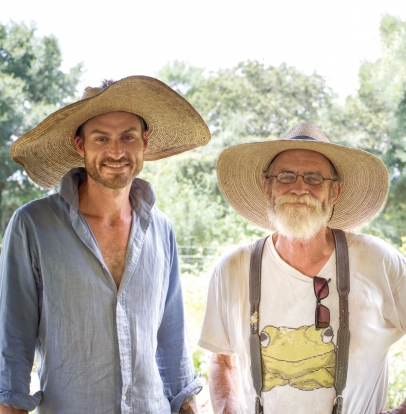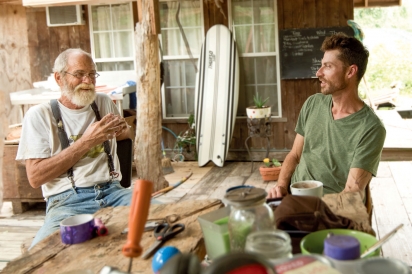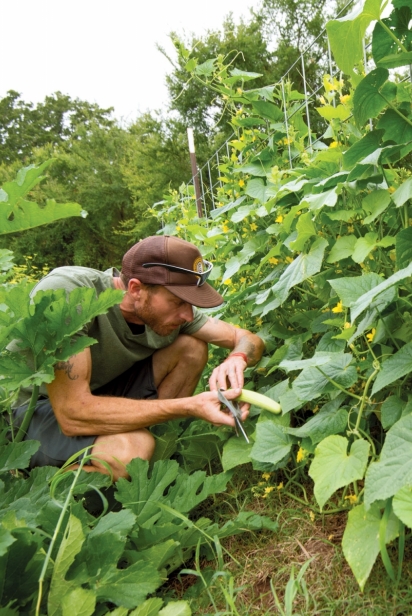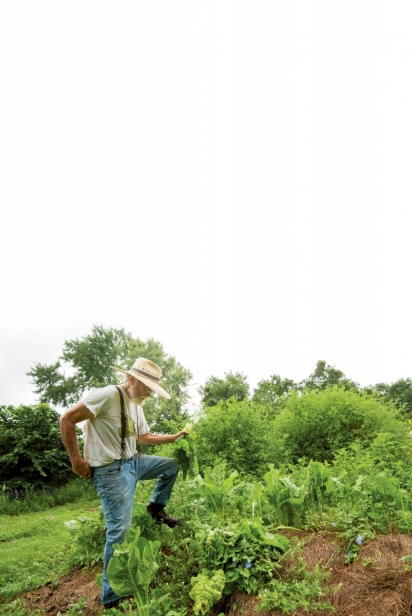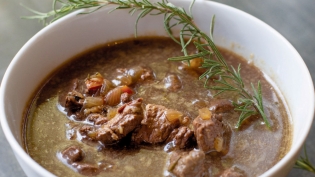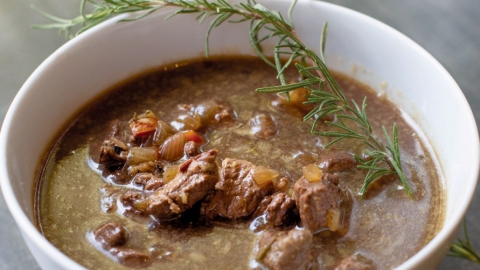Life at Laughing Frog Farm
When Glen Miracle set out to grow food for his family, starting a full-fledged farm wasn’t on his mind. “I had no intention of farming when I moved out here,” he said. “I just wanted to grow my own food. I didn’t think you could make a living doing it … and I’m still not sure you can!”
Miracle, a man with a big smile and sense of humor, purchased the 21 acres that are Laughing Frog Farm with his wife, Kenan Rote, in 2001. His small garden grew quickly and soon there was more food than they could eat. He brought the surplus to market and dreamt of leaving his day job, a goal he achieved in 2008. After eight years of working solo, chef-turned- farmer Chandler Rothbard joined Miracle and the two have been working together since.
When Rothbard moved to the farm, he took over vegetable production allowing Miracle to focus more on the chickens and sheep. The extra help has paid off as the farm has doubled its income since Rothbard joined.
So, what does it take to make this farm profitable? Lots of work and diversification. Miracle has built a farm that has various streams of income and he is always evolving the business. Here are a few of the essential parts of this farm that keep it running and growing, and some of the challenges they encounter along the way.
Quality Vegetable Lineup
Laughing Frog Farm sells at Urban Harvest’s Eastside market each week. And in order to have the best-quality vegetables, steps are taken to preserve the quality of each product as it’s harvested. Miracle doesn’t wash veggies before market because “they have a longer shelf life if they’re washed [immediately] before use. We harvest leafy greens first thing in the morning to ensure they retain moisture. The same is true for most herbs—except basil, which has a terrible shelf life and is harvested in the evening.”
When it comes to the order of harvest after greens Rothbard said, “I go garden by garden and see… what looks good.” But he struggles with something that all farmers do: How much of any given item should be harvested. “There’s always a lot of food, but should I cut it if we’re not going to sell it all?” Customers’ tastes can be fickle and farmers are often left trying to guess what to bring to market. The last thing they want is a truck full of unsold veggies.
Farmers Market Life
On Saturdays, Miracle wakes up before the sun and gets on the road around 4:30am to get into Houston and set up for the 8am market start. When it’s over, it takes time to pack up and contend with traffic back to Hempstead. By 3pm Miracle is back on the farm and has already put in nearly an 11-hour workday. Then it’s time to move the sheep, gather eggs and see to other daily chores.
One of the big challenges of selling at farmers markets is client expectations. The quality of produce can change quickly in the field. Greens that are perfect now may no longer be sellable next week. “Most people don’t understand how much weather affects our products. Consistency can be difficult when you’re in an environment that’s always changing,” said Rothbard. “We go to market and [some people] are surprised if we don’t have arugula one week because rabbits ate it or the weather wasn’t good.” Heat, cold, rain and pest pressure are just a few of the factors that can affect the marketability of products in a matter of days or hours.
Restaurant Relationships and Sales
Laughing Frog Farm is supported by both market and restaurant sales. Each accounts for about half of the farm’s annual revenue. “Every Tuesday, Rothbard figures out what we’re going to have and we talk with the restaurants to see what they want,” said Miracle. State of Grace and its executive chef, Bobby Matos, is their most consistent restaurant relationship. “They’re committed to the concept of making farming work by adapting the menu to our available products.” Other great restaurants they have close relationships with are Weights and Measures and Nobie’s in Houston and Olamaie’s in Austin.
The Pains of Poultry
Raising chicken won’t make you rich, but Miracle feels passionate about providing healthy local chicken to Houston. He raises a breed of chicken called Freedom Ranger, known for being great free-range meat birds. They take about 12 weeks to become full grown, 50% longer than the conventional bird breed, the Cornish Cross. He drives the birds an hour and a half to Lexington, Texas, to get them processed and packaged. Along the way he can lose on his investment in the birds, due to predators, illness or inspection.
“I took in 480 birds in last fall and had 10 that the inspector pulled. It turned out that one of the puppies had been nipping at their legs,” Miracle said. Even tiny marks on the legs from puppy nips are enough to fail inspection at this small, local processing location due to high standards. Scrutiny is higher at these smaller processing locations than at larger plants that process 2,000 birds per hour with only one inspector on site.
To cover all the costs incurred, the processor charges $3.25 per bird, bringing the total for each bird up to $13 just to get it to market.
Making Friends at Farm Dinners
Miracle and Rothbard love doing farm dinners, but admit that they take a lot of work. “You basically throw off the whole week!” said Miracle. “Almost all of the food harvested that week goes to the dinner and we can’t make it to market because we’re busy cooking.”
They’ve decided to do only do five or six dinners a year, but they love having people out to the farm and showing them what is going on during that season. The dinners take place in a beautiful garden— which also features Rothbard’s chainsaw-art dining tables and shade structures constructed from on-site lumber.
Miracle and Rothbard have found their way and are proud of what they’re building at Laughing Frog Farm and its profitability. When asked what he’s learned in the last two years, Rothbard is quick to respond. “Farming is a big experiment. The only times we’ve been successful is when we’ve stepped outside the lines.”


